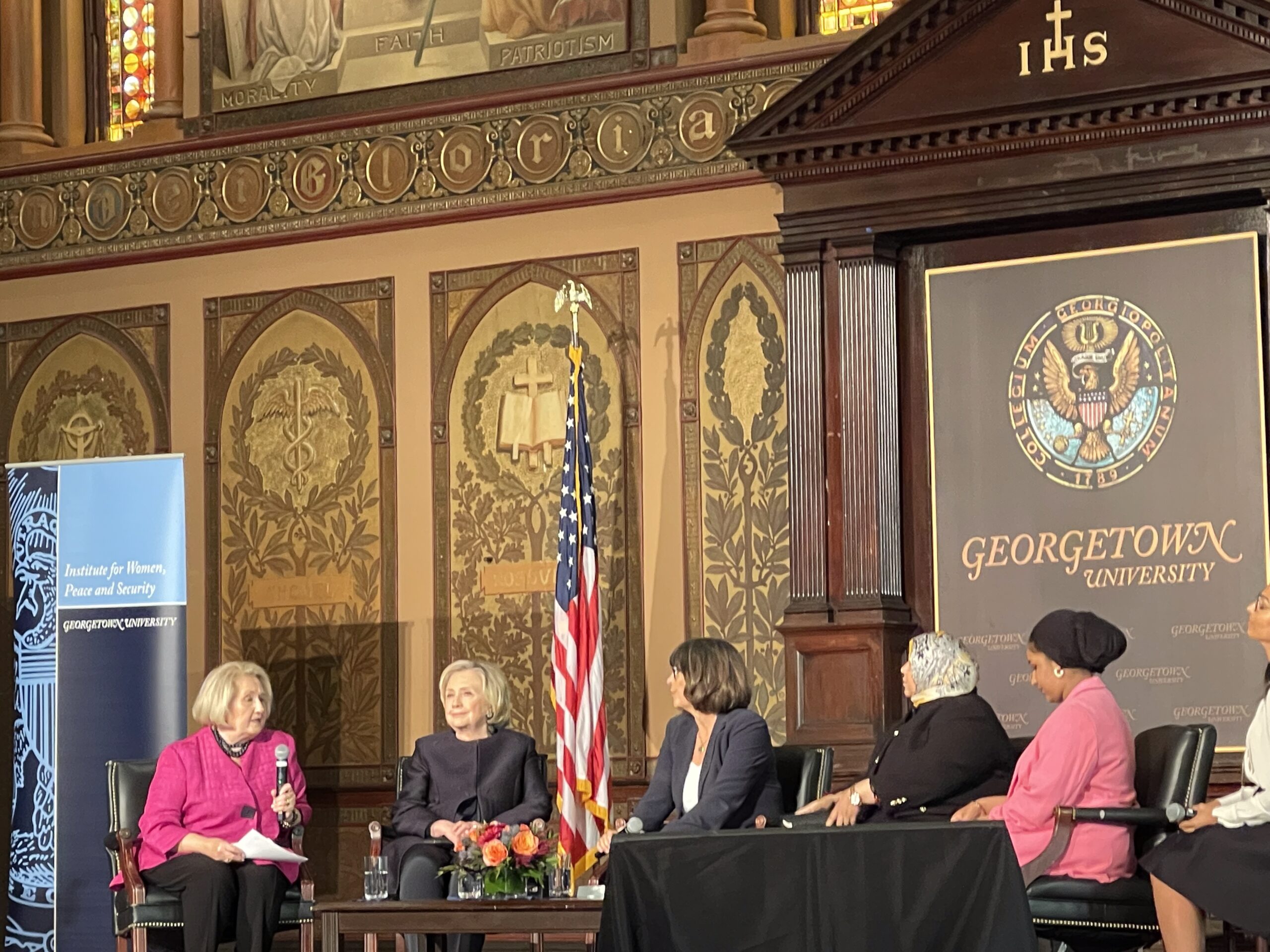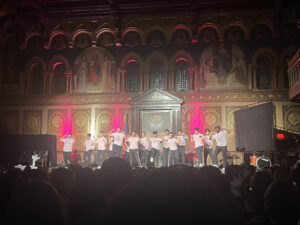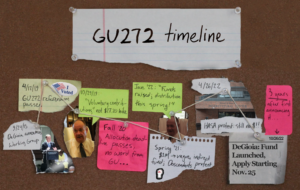The Georgetown Institute for Women, Peace, and Security (GIWPS) hosted the 2023 Hillary Rodham Clinton Awards ceremony on Oct. 5 in Gaston Hall, honoring four women from across the globe who are advancing women’s rights and creating a more peaceful and secure world.
This year’s honorees were Christiane Amanpour, chief international anchor for CNN and Host of CNN International’s Amanpour; Alaa Salah, Sudanese pro-democracy activist; Muna Luqman, Yemeni founder of Food4Humanity and the Women’s Solidarity Network; and Ghalia Alrahhal, Syrian executive director of the Mazaya Organization for Women’s Development.
The event began with remarks from Georgetown President John DeGioia and GIWPS Executive Director Melanne Verveer.
“We’re deeply grateful for this opportunity to recognize each of you at this ceremony,” DeGioia said to the four women. “I want to thank you for your leadership for your outstanding achievements, forging paths for peace, democracy, human rights, and the inclusion of women’s voices around the world.”
Former Secretary of State, Hillary Clinton, gave the keynote speech, highlighting this year’s theme, “Voices for Peace: Celebrating Courageous Women in Journalism and Peacebuilding.”
Clinton stressed the importance of honoring women in diplomatic, journalistic, and peacekeeping efforts in her opening remarks.
“Many leaders use women as a reason for pulling back on rights and see women’s lives and aspirations as a challenge rather than an opportunity for existing power structures,” Clinton said. “These forces that are at work around the world have created perilous times for everything that we have held dear and that we believe in can make a better world for everybody, women and men.”
Despite the hostile environment of the honorees’ homelands — Iran, Sudan, Yemen, and Syria — to women’s rights, Clinton urged world leaders to not define women only by their struggles.
“I think it’s important to recognize that women should not be characterized as victims. I reject that at every turn,” Clinton said. “Women are agents of change and women’s stories are powerful reminders of what is possible.”
When Clinton was asked what the main threat to peace and security is today, she had a quick answer.
“Well, I think the biggest challenge is men starting wars,” she joked. “I don’t think they have enough to do.”
After Clinton’s remarks, each of the honorees were featured in a video overviewing their achievements, and then individually invited to the stage to discuss their work. .
The first honoree was Christiane Amanpour, who has interviewed nearly every global world leader and earned numerous awards throughout her 40-year career, including 11 News and Documentary Emmy Awards, four Peabody Awards, and three duPont-Columbia Awards. Amanpour has often been the only woman present while covering international conflicts on the ground.
“Where there’s war, there’s Amanpour,” Verveer remarked.
When asked about her advice to aspiring journalists, Amanpour’s advice was simple.
“Be truthful, not neutral,” she said. “We’ve been influenced by this fake news idea of what objectivity is. So, my advice to young journalists is to get up and go out there. You can be the actual eyes and ears whether it’s in your local community, in your own home country, or whether it’s abroad, wherever you choose to go. ”
Organizers then played a video address from Syrian women’s rights activist Ghalia Alrahhal, who was unable to make the trip to Washington. .
Alrahhal converted her beauty salon into an education and first aid center for women amid the war in Syria. Her center expanded into what is known today as Mazaya, an organization of eight women’s centers, five children’s centers, and a women’s empowerment magazine. In her video address, Alrahhal highlighted the role Syrian women have played amid the nation’s economic and political turmoil.
“In the shadow of war, women in Syria face very daunting challenges, yet they strive with all their strength and determination to affect positive change,” Alrahhal said. “They strive to provide care and protection for their children, and to secure food under difficult circumstances. They work on developing themselves and on gaining knowledge as they enkindle the candle of hope in their hearts and in their communities.”
After Alrahhal’s video address, the youngest of the awardees, Alaa Salah, received her award. Salah drew worldwide attention in 2019 after a photo of her standing on a car during a protest for Sudanese liberation went viral. Dubbed Kandake — the Arabic name for Lady Liberty — of the Sudanese Revolution, 22-year-old Salah used her newfound fame to spark change for Sudanese women. She has spoken to the UN Security Council, given a TED Talk on Sudanese freedom, and been an advocate for female empowerment in Sudan and beyond.
Speaking with the help of a translator , Salaah discussed the impact ending Sudan’s former dictatorship had on women’s rights. .
“Feminist groups have had a bigger influence in Sudan. They have been able to influence the position of women in the government and also women in civil society,” Salaah said. “Women are capable of having a prominent role in the government and being in positions of decision making and at the negotiation table, and we want to enable them by giving them those opportunities.”
Muna Luqman, a Yemeni activist and coalition builder, was the last to receive her award. Luqman began her career in humanitarianism, providing food, water, and shelter to underserved Yemeni populations, benefitting nearly 120,000 families. In addition to her aid efforts, Luqman has engaged in talks with armed groups, the UN, and U.S. Congress.
Luqman said that part of the key to Yemen’s future success is intersectional feminism in peace building efforts. She created a “feminist roadmap for peace” — a detailed plan for how to uplift Yemeni women in the wake of war — with the Women in Solidarity Network, a group that encourages women to engage in peacebuilding and security. However, the group struggled because their plan wasn’t taken seriously at first.
“[The UN] did not take it seriously. But once they started reading some of the recommendations, they have now been incorporated into the UN peace process.”
Each of the honorees was presented with a commemorative gold trophy shaped like a dove to symbolize their peacekeeping efforts. As the event came to a close, the women acknowledged that their awards signified work that is ongoing.
“Our program has ended,” Verveer concluded. “but our work has just begun.”





